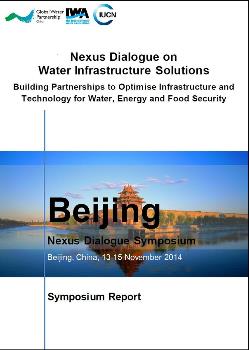Symposium Overview
The Nexus Dialogue on Water Infrastructure Solutions has focussed on developing renewed attention on major infrastructure development for water, energy, food security and climate change resilience. Since 2013, IUCN and IWA have successfully organized a series of regional workshops in Africa, Latin America, Asia (with UNESCAP) and Central Asia (with EastWest Institute) on the role of infrastructure in the nexus. The most recent event was the Symposium on Infrastructure Solutions in the Water-Energy-Food Nexus in Beijing, China in November 2014 in partnership with GWP China.
China is the most populous country in the world, with approximately 1.3 billion people (22% of the world population). In order to sustain the population and economy, there is a growing demand for water. However, water scarcity is threating many cities and regions in China. About 400 of China’s 660 cities are reportedly short of water; of those, 108 cities, including megacities like Beijing and Tianjin, are facing serious water shortages.
Water is potentially the major barrier for energy generation and food production in China and many other regions. There is a call for coordination and collaboration where people from different countries and sectors work together to solve challenges in water-energy-food nexus. The Dialogue provided an opportunity to discuss the water-energy-food dilemma in China and other countries that are facing similar problems
We invited more than 80 outstanding international and regional professionals, from both public and private sectors from previous Nexus Dialogue regional workshops, together with new faces. The Beijing Symposium provided the opportunity for participants to share experiences and learning with Chinese experts; discuss findings from the global nexus dialogue to date, and to feed into the development of concepts and ideas. The Symposium provided space for participants to work on a set of recommendations, which will establish policy principles for sustainable water infrastructure operation, management and optimization in the nexus.
Symposium Themes
In order to bring together sectoral and integrated best practice, and to make insightful connections between the sectoral components of the nexus, the Symposium was centred around five themes including:
1. Clean technology (Cleantech) for water, energy and food infrastructure solutions - the use of clean technology which supports provision and efficiencies across sectors
2. Using the nexus to accelerate social development and support water stewardship and corporate engagement – This theme focused on social and economic development approaches, including corporate sector engagement in linking water, energy and food security and accelerating infrastructure development across scales.
3. Influencing pathways of investments for in the nexus - This theme examined money flows channelled into infrastructure and technology especially in emerging economies, and the factors influencing the pathway of these investments to resource water-energy-food nexus solutions.
4. Natural infrastructure/ecosystems in the nexus - This theme sought to promote better understandings of the importance of healthy ecosystems in well-functioning infrastructure built for irrigation, hydropower or municipal water supply, and in achieving the economic returns necessary to justify investments.
5. Power dynamics (policy and institutional change/collaboration) across the nexus - This theme gave special attentions to current and future policies for sustainable water infrastructure operation, management and optimization in the nexus, with the expectation of moving cross-sectoral discussions to implementation mode, focusing on improving the enabling environment to ensure that collaboration and joint solutions lead to shared benefits.
An important outcome of the Symposium was discussion of five synthesis papers that mirrored those five themes. Synthesis papers highlighted sectoral and integrated best practices, and made insightful connections between the sectoral components of the nexus. In addition, key recommendations were further developed for each theme.
Participants also contributed to the development of a framework to identify concrete nexus challenges and analyse examples of inter-sectoral collaboration, incentives for policy coherence, roles of actors and institutions and joint visioning & planning.
The Dialogue will be part of thematic sessions at the 7th World Water forum in Daegu and Gyeongbuk, South Korea, 12-17 April, 2015
Symposium Report
- CBCSD and Members Participated and Suggested on the Project for Technical Regulation on Low-carbon Pilot Community
- CBCSD and Members Participated in the APEC Cooperation Network Construction Forum of Green Supply Chain
- Calculation Method of CO2 Emissions in Petroleum and Natural Gas Exploitation Enterprises & Calculation Method of CO2 Emissions in Water Network of Chemical Enterprises
- CBCSD Attended the Workshop for Environmental Protection and Sustainable Development and Delivered Introductions
- WBCSD: Tackling the Challenge, How to Make Informed Choices on Forest Product?
- The National New-Type Urbanization Plan Released, Board Members of CBCSD Help the Sustainable Development of Cities
- Board members of CBCSD Actively Participated in the Carbon Trading and International Climate Change Process
- Two industrial Standards Compiled by CBCSD Passed Examination
- Widespread Use of the Achievements Businesses Energy Saving and Greenhouse Gas Management
- CBCSD held Chemical industry enterprise value chain (range 3) greenhouse gas emissions, accounting and reporting guidelines


